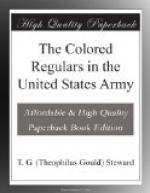“First Sergeant Edward Ratcliff, Company C, Thirty-eighth United States Colored Troops, thrown into command of his company by the death of the officer commanding, was the first enlisted man in the enemy’s works, leading his company with great gallantry for which he has a medal.”
“Sergeant Samuel Gilchrist, Company K, Thirty-sixth United States Colored Troops, showed great bravery and gallantry in commanding his company after his officers were killed. He has a medal for gallantry."[31]
“Honorable mention” and “medals” were the sole reward open to the brave Negro soldiers of that day.
Not alone in camp and garrison, in charge of expeditions, or as non-commissioned officers thrown into command of their companies on the field of battle have Negro soldiers displayed unquestioned capacity for command, but as commissioned officers they commanded in camp and in battle, showing marked efficiency and conspicuous gallantry. The colored officers of the First and Second Regiments of Louisiana Native Guards, whose history has been detailed earlier in this chapter,[32] were retained in the service long enough to command their troops in bloody combat with the enemy. It will be remembered that of the Second Regiment of Louisiana Native Guards only the Colonel and Lieutenant-Colonel were white, the Major, F.E. Dumas, and all the line officers, as in the case of the First Regiment of Louisiana Native Guards, being colored. On April 9, 1863, Colonel N.U. Daniels, who commanded the Second Regiment of Louisiana Native Guards, with a detachment of two hundred men of his regiment, under their colored officers, engaged and repulsed a considerable body of rebel infantry and cavalry at Pascagoula, Mississippi. The engagement lasted from 10 A.M. until 2 P.M. and was remarkable for the steadiness, tenacity and bravery of these black troops in this, their first battle, where they succeeded in defeating and beating off an enemy five times their number. The official report by the Colonel commanding declared: “Great credit is due to the troops engaged for their unflinching bravery and steadiness under this, their first fire, exchanging volley after volley with the coolness of veterans, and for their determined tenacity in maintaining their position, and taking advantage of every success that their courage and valor gave them; and also to their officers, who were cool and determined throughout the action, fighting their commands against five times their number, and confident throughout of success. * * *
“I would particularly call the attention of the department to Major F.E. Dumas, Capt. Villeverd and Lieuts. Jones and Martin, who were constantly in the thickest of the fight, and by their unflinching bravery and admirable handling of their commands, contributed to the success of the attack, and reflected great honor upon the flag for which they so nobly struggled."[33]




